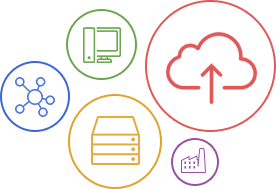In today's digital world, a strong IT infrastructure is no longer an option for businesses - it is a necessity. The right IT infrastructure forms the bedrock upon which businesses build their operations, helping them to function efficiently and competitively in an increasingly interconnected and data-driven world. An effectively managed IT infrastructure can accelerate a company's ability to innovate, enhance customer experiences, ensure business continuity, and drive growth. This article will explore the key components of essential IT infrastructure for successful business operations.
Hardware
Hardware is the physical aspect of IT infrastructure. This includes computers, servers, routers, switches, data storage devices, and other equipment. Each of these plays a crucial role in business operations.
For example, servers support the execution of software that provides essential business services. Data storage devices, such as Network Attached Storage (NAS) or Storage Area Networks (SAN), facilitate the storage and retrieval of large amounts of data.
High-quality hardware is paramount because hardware failure can cause significant disruptions to business operations. Therefore, businesses should invest in robust and reliable hardware and ensure they have appropriate maintenance and replacement strategies in place.
Also Read: What Exactly Is Hardware Configuration?
Software
Software is a critical component of IT infrastructure. It includes operating systems, databases, enterprise resource planning (ERP) systems, and other applications that businesses use to perform various tasks.
For instance, operating systems provide an environment for other software to run. ERP systems integrate various business processes, such as inventory management, accounting, and human resources, into one comprehensive system. These systems automate and streamline business operations, leading to increased efficiency and productivity.
"Choosing the right software can significantly impact a business's performance. Therefore, businesses should carefully evaluate their needs and select software that can effectively meet those needs."- Emil Isanov
Networks
Networks are another fundamental component of IT infrastructure. They enable the transfer of data between different devices, allowing them to communicate and interact with each other. Networks can include Local Area Networks (LAN), Wide Area Networks (WAN), and more recently, software-defined networks (SDN).
In today's digital era, businesses are more connected than ever, both internally and externally. Networks allow employees to collaborate and share information seamlessly, no matter where they are located. Externally, networks enable businesses to connect with customers, suppliers, and partners, creating an integrated business ecosystem.
suppliers, and partners, creating an integrated business ecosystem.
Businesses should ensure their networks are secure, reliable, and scalable to accommodate the growing demand for bandwidth and data transfer.
Also Read: What Is Network Management And How Can It Help Your Business?
Data Centers
Data centers are facilities that house a business's IT infrastructure. They contain servers, storage systems, and network devices. Data centers provide a controlled environment to ensure that hardware operates optimally and is protected from potential threats such as power outages or environmental hazards.
Modern data centers have evolved into complex environments that not only provide storage but also offer services like cloud computing, which allows businesses to use computing resources on-demand over the internet.
In recent years, the trend has been moving towards cloud-based data centers offered by providers like Amazon Web Services (AWS), Google Cloud, and Microsoft Azure. These providers offer scalable and cost-effective data center services, eliminating the need for businesses to invest heavily in their own physical data centers.
Conclusion
A strong IT infrastructure is a cornerstone of successful business operations in the digital age. By investing in quality hardware, selecting effective software, maintaining secure and scalable networks, and leveraging modern data center services, businesses can create an IT infrastructure that supports their operations, drives efficiency, and fosters growth.
While setting up a robust IT infrastructure requires substantial investment and expertise, the payoff in terms of improved operational efficiency, enhanced customer service, and increased business resilience makes it a worthwhile endeavor. As businesses continue to navigate the digital landscape, those with a robust IT infrastructure will be best positioned to thrive.
.png)
Facebook: facebook.com/etech7
Twitter: twitter.com/etech7
Instagram: instagram.com/etech_7/
Blog: blog.etech7.com/














